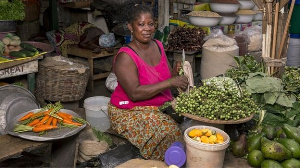Ghana’s Consumer Price Index (CPI) for June this year has slightly dropped to 11. 2 per cent from 11.3 per cent recorded last month, the Ghana Statistical Service (GSS) has said.
According to the GSS, the drop was 0.1 percentage points lower than that of May while the monthly inflation rate between May and June is one per cent.
CPI measures changes in the price of a fixed basket of goods and services purchased by households
Speaking at a press conference in Accra yesterday, the Government Statistician, Samuel Kobina Annim said “even though year-on-year inflation for June is still higher compared to pre-Covid-19 inflation, month-on-month inflation and month-on-month food inflation are lower than previous two months. This indicates that the prices did continue to rise, but not as much as the previous two months”
Mr Annim said food inflation was 13.8 per cent as compared to 15.1 per cent recorded last month while inflation for non-food for June was pegged at 9.2 per cent.
Within the food sector, he said four sub groups recorded rates higher than the national inflation stating that the subgroups were vegetables 28.8 per cent, fruits and nuts 17.4 per cent, fish, seafood 14.3 per cent and ready-made food 12.2 per cent.
On the regional basis, Western has the highest food inflation of 21.3 per cent followed by Ashanti with 20.6 per cent and Greater Accra with 13. 9 per cent.
For non-food sector, two sub groups recorded rates higher than 9.2 per cent. The subgroups were housing, water electricity and Gas 21.3 per cent and food and non-alcoholic beverages 13.8 per cent
For locally produced foods, he said the rate was 13.9per cent while that of imported items was 4.7 per cent
Mr Annim said the monthly inflation on imported goods was 0.7 per cent while that of locally produced goods was 11 per cent adding that both percentages were lower than corresponding numbers of last month which had 0.8 for imported goods and 2.1 for locally produced goods.
At the regional level, the Government Statistician said, four regions recorded inflation higher than the national rate.
He said the regions were Greater Accra 15.0 per cent, Western 13.5 per cent, Eastern 12.6 per cent and Ashanti region 11.6 per cent.
Source: ghanaiantimes.com.gh
 Home Of Ghana News Ghana News, Entertainment And More
Home Of Ghana News Ghana News, Entertainment And More





